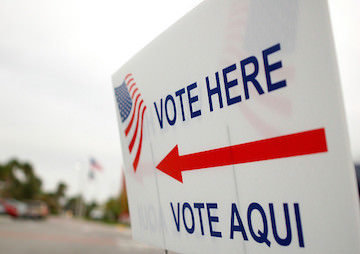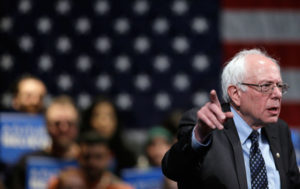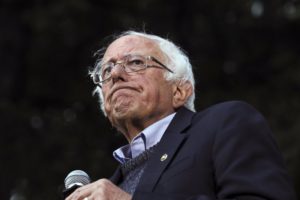The Long and Painful Road to Iowa
As voting in the 2016 presidential campaign begins, it's apparent that this strange and melodramatic contest was created by the political upheaval that didn't immediately happen after 9/11, the failure of the Iraq War and the Great Recession. Erik (HASH) Hersman / CC BY 2.0
Erik (HASH) Hersman / CC BY 2.0
Politics sometimes moves with lightning speed and in a clear direction. The rise of the New Deal coalition in the midst of the Great Depression is an example of how fast things can change.
But often, currents of anxiety and rage swirl below the surface. Citizens, stunned by large events and torn by contradictory feelings, can’t figure out immediately where they want to go.
As voting in the 2016 presidential campaign begins, it’s apparent that this strange and melodramatic contest was created by the second kind of history. This is the political upheaval that didn’t immediately happen after the attacks of Sept. 11, 2001, after the failure of the war in Iraq, after the Great Recession.
Americans made the best sense they could of these events as they came along. The 9/11 tragedy called forth a spirit of national unity, but it quickly gave way to a renewed partisan acrimony after President George W. Bush launched the invasion of Iraq. Divisions worsened as the war bogged down. The Great Recession deepened the backlash against Bush and paved the way to President Obama’s victory in 2008.
If we had followed the New Deal path to political realignment, Obama’s election would have inaugurated another Democratic and progressive era, built on frustration with Middle East intervention and rage over Wall Street’s role in bringing down the economy.
But events and the underlying makeup of the American electorate did not cooperate. While the economic implosion happened on Bush’s watch, most of the pain was experienced after Obama’s inauguration. FDR, by contrast, took over after three years of suffering, and all the blame for it fell on Herbert Hoover.
Obama’s policies and those of Ben Bernanke, the Federal Reserve chairman, brought us back from the brink. But they took time to work. And the new president was so determined to live up to his promise to end the divide between red and blue that he was slow in taking on his GOP foes.
Republicans did not return the favor. They obstructed his policies and made a Congress led by Democrats look feckless. The 2010 elections brought not ratification of the new Obama alignment but its reversal. Many of the young voters who played such an important role in making Obama president stayed home.
In the meantime, the Middle East exploded and the Islamic State rose. Americans continued to be skeptical of the Iraq War, but were wracked with new worries about American power and global stability. If Obama is right to insist that the United States is not in decline, declinism is a widespread sentiment and a major intellectual industry.
All this took place as the vast changes in the country’s demography set in motion by the 1965 immigration act became highly visible, calling forth the brilliantly vague “Take Our Country Back” slogan. It was a Rorschach message for the right, uniting those who wanted to take the country back from liberalism and the Democrats, back from a cosmopolitan African-American president, back from new values that included same-sex marriage, and back from the new non-white groups who loom so large in the country’s future.
And so here we are. Donald Trump and Ted Cruz appeal to different parts of the “Take Our Country Back” crowd, now a large proportion of the Republican primary and caucus electorate. The Trumpian dispensation is almost perfectly matched to the anxious restlessness of a wing of conservatism that cares little about programs or ideology. Instead its loyalists are determined to strike, hard, at a diverse array of enemies they see as having brought the nation to a place they do not like at all.
Bernie Sanders, different from our incumbent president in many ways, draws in Democratic voters, especially the young, still looking for the transformational politics that was the flip side of Obama’s 2008 appeal. Sanders proposes to resolve the contradictions of Obamaism: Forget the part about bringing us together; just organize a progressive majority for real.
In the meantime, Hillary Clinton’s campaign might be summarized by the words of the old civil rights song: “Keep your hand on the plow, hold on.” She insists that more painstaking, practical effort will, over time, get us to where Obama promised to arrive.
Clinton is selling what might be seen in these times as heroic realism, heroic because it flies in the face of a widespread desire for certainty and clarity. To borrow a phrase from the Australian writer Paul Kelly, this election may turn on how well we can live with the end of certainty.
Your support matters…Independent journalism is under threat and overshadowed by heavily funded mainstream media.
You can help level the playing field. Become a member.
Your tax-deductible contribution keeps us digging beneath the headlines to give you thought-provoking, investigative reporting and analysis that unearths what's really happening- without compromise.
Give today to support our courageous, independent journalists.






You need to be a supporter to comment.
There are currently no responses to this article.
Be the first to respond.